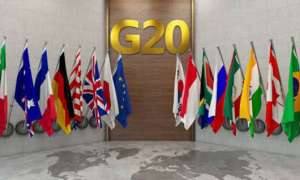
The Group of 20 (G20) leaders concluded their annual summit in Brazil on Tuesday, leaving analysts and observers underwhelmed with the outcomes of their joint declaration. The meeting, which brought together the world’s major economies, failed to meet expectations, particularly regarding financial commitments to tackle hunger, poverty, and climate change.
John Kirton, director and founder of the G20 Research Group at the University of Toronto, described the declaration as “disappointing,” citing the lack of new funding pledges for critical global issues.
“I had expected that when the summit started, the leaders of the richest countries in the world would start to put more money into the pot, into their joint leaders’ declaration, but there was nothing there,” said Kirton, professor emeritus of political science.
The summit began on Monday with Brazilian President Luiz Inácio Lula da Silva unveiling a global alliance to combat hunger and poverty, supported by over 80 countries, international organizations, and philanthropic entities. The initiative aims to eradicate hunger, reduce poverty, and diminish inequalities by 2030.
While countries such as the United States pledged support, the absence of these commitments in the official declaration raised concerns.
“Without putting it down on paper, it can disappear into thin air. That, I think, was the biggest disappointment,” said Prof. Kirton. “They can’t transform the world, as they promised to do, without raising any new money for climate finance, debt relief, and support for the poorest communities.”
The timing of the summit, coinciding with the end of US President Joe Biden’s term, added a layer of uncertainty to the commitments made. With only two months left in office, Biden’s pledges may not survive the transition to the incoming Donald Trump administration.
Trump’s campaign rhetoric and post-election actions suggest a stark policy shift. He has previously called climate change “a big hoax” and recently nominated fracking magnate and climate skeptic Chris Wright as his energy secretary.
Political analyst Joe Siracusa from Curtin University expressed doubt about Trump’s willingness to fund global initiatives: “Donald Trump’s not going to write that cheque.”
Observers were particularly critical of the summit’s lack of progress on climate change. Despite acknowledging the urgency of the issue, G20 leaders failed to announce new funding for climate finance, leaving significant gaps in support for developing countries.
“The joint declaration was issued even before leaders met to discuss climate change, green finance, and renewable energy,” noted Prof. Kirton. “It was a missed opportunity to tackle the biggest issue of all – controlling the existential threat of climate change.”
This failure comes as COP29 climate talks in Azerbaijan approach their conclusion, with a new financial framework for rich nations to support poorer countries still unresolved. Officials at COP29 had called on G20 leaders to deliver a strong signal to break the deadlock.
In an unexpected pivot, the G20’s joint declaration emphasized global peace and security, reflecting an expanded remit into geopolitical issues. The document addressed the ongoing Ukraine war and the escalating humanitarian crisis in Gaza.
Leaders expressed “deep concern about the catastrophic humanitarian situation in the Gaza Strip” and called for a comprehensive ceasefire and greater protection for civilians in Gaza and Lebanon. On Ukraine, the declaration condemned “human suffering” but stopped short of explicitly blaming Russia for the conflict.
“The biggest surprise was how much the G20 addressed global peace and security, signaling that it had become a global security governor,” said Prof. Kirton. However, he criticized the vague language on Ukraine, noting that the declaration avoided labeling Russia’s actions as aggression.
This year’s summit also highlighted a shift toward a multilateral world order. Emerging economies from the Global South, including India, South Africa, and Brazil, took on more prominent roles in shaping the agenda, while traditional powers appeared less dominant.
“There are now many centers of influence,” said Prof. Siracusa. “Global South powers are calling the tune, whereas some larger powers are sitting in the background, not doing much.”
This shift reflects a growing tendency among nations to selectively engage with international blocs. Siracusa warned that if the United States under Trump withdraws from global forums like the G20, G7, and United Nations, it risks becoming a bystander on the world stage.
The G20 leaders’ declaration underscores the growing complexities of international cooperation. While the summit addressed pressing global challenges, it lacked the concrete commitments necessary to deliver transformative change. As climate crises intensify and geopolitical tensions rise, the outcomes of the Rio de Janeiro summit leave much work to be done.
The G20 remains uncertain. With the looming transition in US leadership and mounting global challenges, the group’s ability to foster meaningful cooperation will be put to the test. For now, analysts like Prof. Kirton and Siracusa remain skeptical about the G20’s capacity to deliver on its promises without stronger financial commitments and a unified vision.






